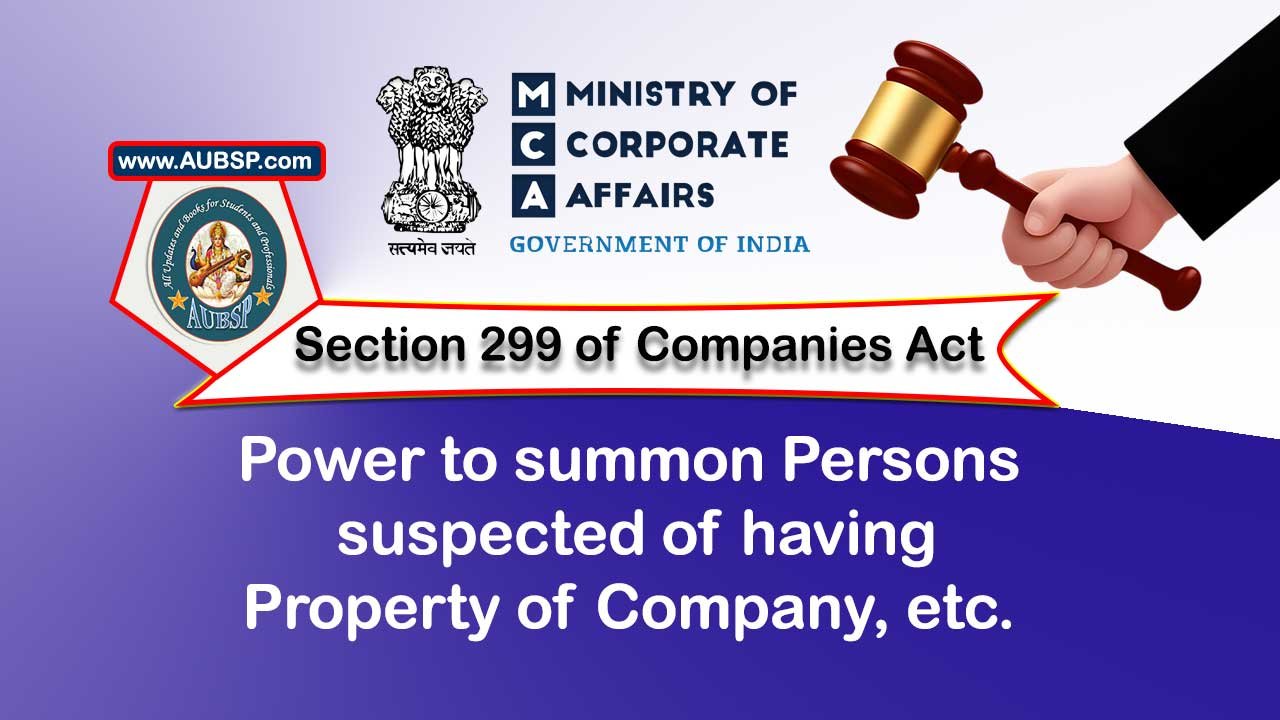Amended and updated notes on section 299 of Companies Act 2013. Detail discussion on provisions and rules related to power to summon persons suspected of having property of company, etc.
Chapter XX (Section 270–365) of the Companies Act, 2013 (CA 2013) deals with the provisions related to winding up. Section 299 of CA 2013 provides for power to summon persons suspected of having property of company, etc.
Recently, we have discussed in detail section 298 (Power to order costs) of CA 2013. Today, we learn the provisions of section 299 of the Companies Act 2013.
The provisions of section 299 are effective from 15th December, 2016. You may refer Notification No. S.O. 3677(E) issued dated 7-12-2016. In this article, you will learn detail of the provisions of section 299 the Companies Act 2013.
| Name of Act | The Companies Act 2013 |
|---|---|
| Enacted by | Parliament of India |
| Administered by | Ministry of Corporate Affairs (MCA) |
| Number of Chapters | 29 |
| Number of Sections | 484 (470-43+57) |
| Number of Schedules | 7 |
| You are reading: | |
| Chapter No. | XX |
| Chapter Name | Winding Up |
| Section No. | 299 |
| Section Name | Power to summon persons suspected of having property of company, etc. |
| Monthly Updated Edition | Company Law PDF |
Section 299 of Companies Act 2013: Power to summon persons suspected of having property of company, etc.
Section 299 shall come into force on 15th December, 2016 vide Notification No. S.O. 3677(E) dated 07.12.2016.
(1) The Tribunal may, at any time after the appointment of a provisional liquidator r the passing of a winding up order, summon before it any officer of the company or person known or suspected to have in his possession any property or books or papers, of the company, or known or suspected to be indebted to the company, or any person whom the Tribunal thinks to be capable of giving information concerning the promotion, formation, trade, dealings, property, books or papers, or affairs of the company.
(2) The Tribunal may examine any officer or person so summoned on oath concerning the matters aforesaid, either by word of mouth or on written interrogatories or on affidavit and may, in the first case, reduce his answers to writing and require him to sign them.
(3) The Tribunal may require any officer or person so summoned to produce any books and papers relating to the company in his custody or power, but, where he claims any lien on books or papers produced by him, the production shall be without prejudice to such lien, and the Tribunal shall have power to determine all questions relating to that lien.
(4) The Tribunal may direct the liquidator to file before it a report in respect of debt or property of the company in possession of other persons.
(5) If the Tribunal finds that—
- (a) a person is indebted to the company, the Tribunal may order him to pay to the provisional liquidator or, as the case may be, the liquidator at such time and in such manner as the Tribunal may consider just, the amount in which he is indebted, or any part thereof, either in full discharge of the whole amount or not, as the Tribunal thinks fit, with or without costs of the examination;
- (b) a person is in possession of any property belonging to the company, the Tribunal may order him to deliver to the provisional liquidator or, as the case may be, the liquidator, that property or any part thereof, at such time, in such manner and on such terms as the Tribunal may consider just.
(6) If any officer or person so summoned fails to appear before the Tribunal at the time appointed without a reasonable cause, the Tribunal may impose an appropriate cost.
(7) Every order made under sub-section (5) shall be executed in the same manner as decrees for the payment of money or for the delivery of property under the Code of Civil Procedure, 1908.
(8) Any person making any payment or delivery in pursuance of an order made under sub-section (5) shall by such payment or delivery be, unless otherwise directed by such order, discharged from all liability whatsoever in respect of such debt or property.

